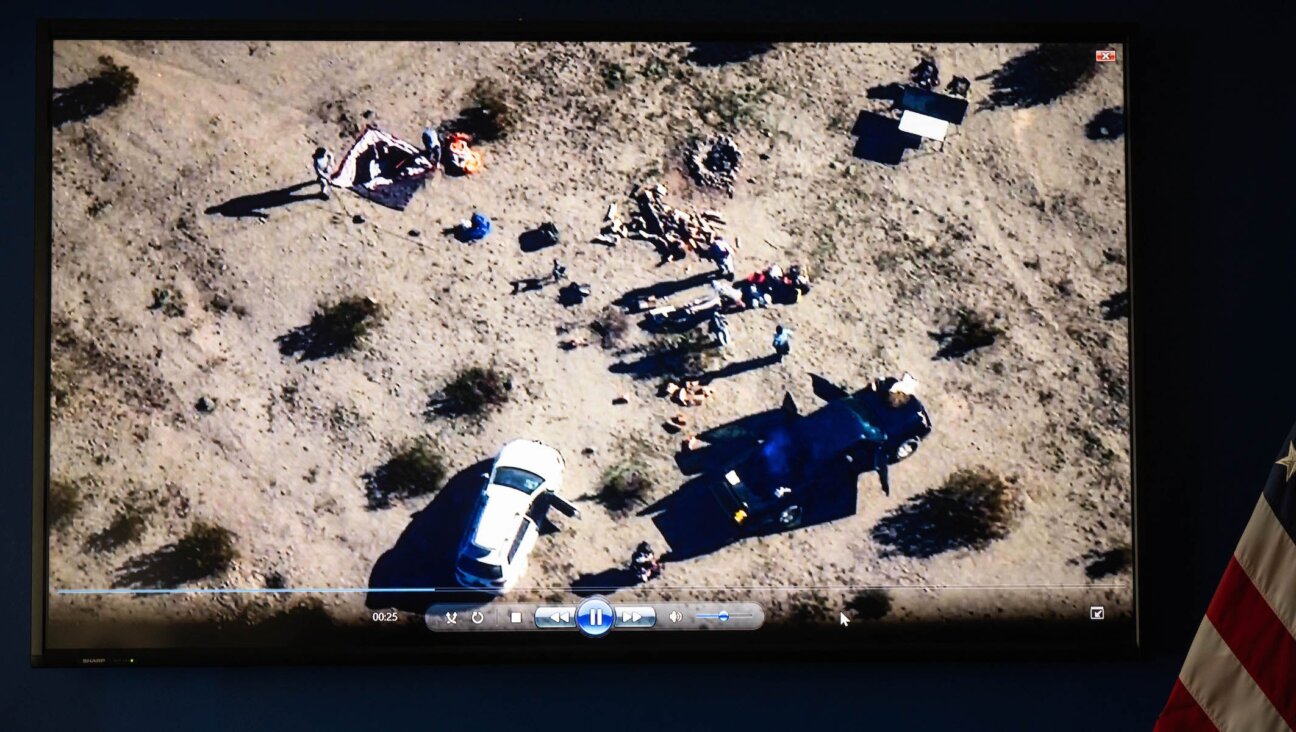Intel Agencies Fear Iran Used Chalabi To Lure U.S. Into Iraq
American intelligence and law enforcement agencies are investigating the possibility that Ahmad Chalabi, the former Iraqi exile leader, was used by Iranian intelligence to feed Washington false information on Iraq, with the goal of tricking America into deposing Saddam Hussein, Iran’s archenemy, several intelligence sources have confirmed.
Chalabi, once the darling of the Bush administration’s hawkish wing, has been under a cloud of suspicion for the past two weeks, since the Pentagon cut off its funding to his organization, and Iraqi security forces raided his Baghdad home and offices May 20. The New York Times reported Wednesday that American intelligence officials believe Chalabi informed an Iranian official that the United States had broken the secret communications code of Tehran’s intelligence service.
But the far more serious suspicion in intelligence circles is that he passed Iranian disinformation on Iraq to Washington in order to bolster American support for regime change in Baghdad. The allegation was first disclosed May 22 in the Long Island-based Newsday. Expanded accounts have since appeared in the London-based Guardian, the conservative Washington Times and Israel’s mass-circulation Yediot Aharonot.
Chalabi and his supporters have dismissed all the allegations against him as part of a CIA-orchestrated smear campaign. One Chalabi supporter, Danielle Pletka, vice presi- dent of the American Enterprise Institute, a conservative Washington think tank, called the disinformation charge “the stupidest thing I ever heard.”
But several former intelligence officials told the Forward that the CIA, which has long opposed U.S. support to Chalabi, believes the former Iraqi exile is an Iranian agent and that this might have enabled Tehran to mastermind an intelligence operation of such magnitude.
“The CIA firmly believes that Chalabi is an Iranian agent,” former CIA analyst Larry Johnson told the Forward. “Based on that, I believe Iran used us to carry their water and get rid of Saddam Hussein.”
Asked why the CIA had not raised the issue earlier, Johnson replied that the agency had in fact repeatedly warned U.S. officials about Chalabi’s Iranian connections — but was ignored by the Pentagon. Johnson said CIA Director George Tenet also ignored the warnings of his own analysts, choosing instead to tow the administration’s hawkish line on Iraq.
Officials at the CIA, as well as at the State Department, have long held a skeptical view of Chalabi, who is often cited as the main source for the notion that Hussein was developing weapons of mass destruction and U.S. forces would be welcome as liberators by the Iraqi people. But now Chalabi’s enemies are raising the specter that his neoconservative allies in Washington — as well as President Bush — were the unwitting dupes of Iran, one of America’s and Israel’s most dangerous enemies.
Chalabi’s supporters dismiss such claims as implausible conspiracy theories pushed by longtime political enemies with axes to grind. But in recent weeks, several media outlets have published reports lending credence to the claim of deeper ties between Chalabi and Iran.
Newsday’s initial report claimed that the Pentagon’s Defense Intelligence Agency had concluded that Iran used Chalabi’s intelligence operation to feed false information to Washington. Similar claims then appeared in the Guardian of London and United Press International, whose dispatch appeared in the right-leaning Washington Times. The Israeli daily Yediot Aharonot published a long exposé on the topic on May 28, in its highly respected weekend edition. An article the same day by former Clinton administration aide Sidney Blumenthal, now the Washington editor of the online journal Salon, also pushed the story.
“The Iraqi neocon favorite… has been identified by the CIA and the Defense Intelligence Agency as an Iranian double agent,” Blumenthal wrote. Blumenthal added, “Either Chalabi perpetrated the greatest con since the Trojan horse, or he was the agent of influence for the most successful intelligence operation conducted by Iran, or both.”
Chalabi, a member of the 25-person Iraqi Governing Council, has steadfastly denied allegations that he is an Iranian agent. He repeatedly has accused the CIA of conducting a smear campaign against him in order to settle old scores.
In attempts to raise doubts about the latest accusations against the Iraqi politician, several observers pointed out that most of the stories alleging an Iranian plot have come from sources at the CIA or the Defense Intelligence Agency. Operatives at both agencies have opposed Chalabi since the mid-1990s, and now blame him for passing on fabricated weapons information.
In addition, skeptics argue, it would have made little sense for Iran to lure U.S. troops into Iraq at a time when Tehran already was worried about the American presence in neighboring Afghanistan.
“Interesting, but too baroque and not very plausible,” said Daniel Benjamin, a former Clinton administration official, of the alleged Iranian intelligence plot. “There was more than enough motivation within the administration to invade Iraq.”
Chalabi supporters went even further in their criticism.
“Just because Iran hated Saddam doesn’t mean Saddam was a good guy,” said Pletka. “Chalabi was always up-front about his closeness with Iran. If the U.S. had been more helpful, he may not have needed them as much.”
In an interview with the Forward last week, Richard Perle, the former chairman of the Pentagon’s advisory body and arguably Washington’s most influential neoconservative, claimed that Iran had actually provided clues of its close relationship with Chalabi to the CIA in order to discredit him.
Through much of the 1990s, Chalabi’s Iraqi National Congress maintained an office in Tehran while running a U.S.-funded program to gather Saddam Hussein-era documents and provide Washington with informants. Chalabi himself has made no secret about his links to the Iranian leadership, arguing that as Iraq’s biggest neighbor and an opponent of Saddam Hussein, it was natural for him to seek positive relations.
In recent weeks, however, speculation about a closer relationship between Chalabi and Tehran has been fueled by allegations that Chalabi’s intelligence chief, Aras Karim Habib, was an Iranian agent. The FBI has opened an investigation into whether sensitive U.S. intelligence was indeed passed to Tehran via Chalabi’s Iraqi National Congress. Several U.S. officials are said to be under FBI scrutiny for supplying secrets to Chalabi, both at the Coalition Provisional Authority in Baghdad and at the Pentagon, where several of his strongest supporters now work.
“Some in the intelligence community have made a persuasive case that Iranian intelligence used Aras Habib Karim to [lure the United States into Iraq],” an intelligence source said. “Certainly Aras was central in producing the sources who provided so much disinformation to Western countries that then shared their reports, without sourcing, thus providing false confirmation.”
In its May 22 article, Newsday cited intelligence sources claiming that the Defense Intelligence Agency concluded that the intelligence arm of the INC had been used for years by Iranian intelligence to pass disinformation to the United States and to collect highly sensitive American secrets. The former director of the DIA’s Middle East branch, Patrick Lang, was quoted as saying the alleged Iranian plot was “one of the most sophisticated and successful intelligence operations in history.”
















